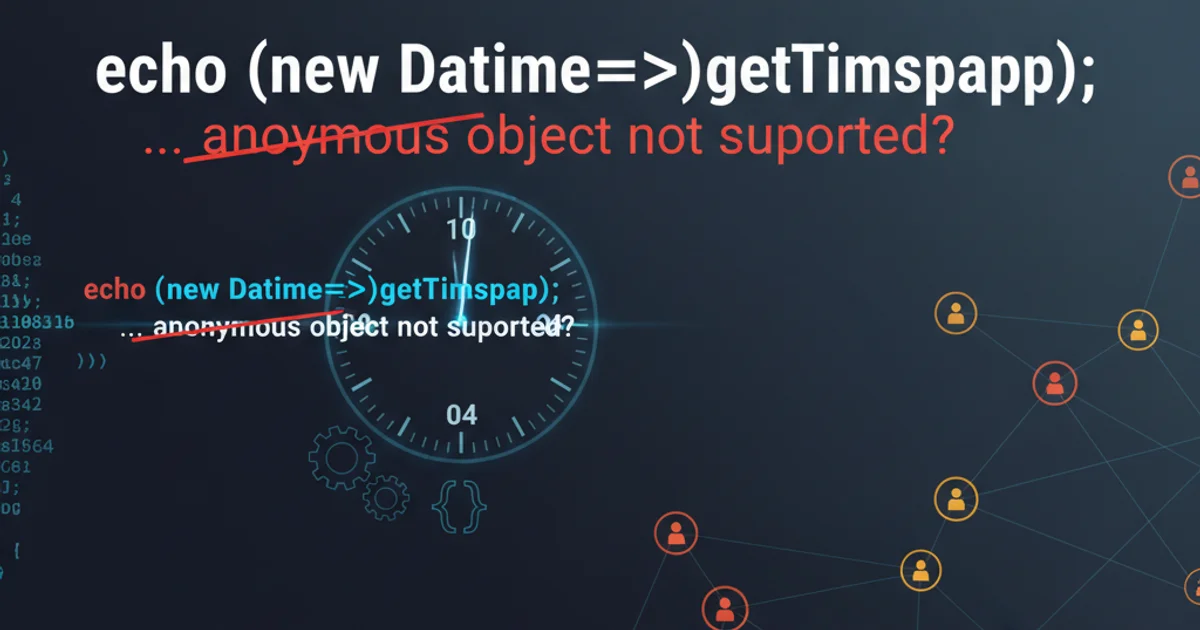echo (new DateTime())->getTimestamp(); ... anonymous object not suported?
Categories:
Understanding Anonymous Objects and DateTime in PHP

Explore the nuances of using anonymous objects, specifically (new DateTime())->getTimestamp();, in PHP and common pitfalls related to their support and behavior across different PHP versions.
PHP, like many modern languages, supports anonymous objects, which are instances of classes that are not assigned to a variable. This can be a concise way to call a method on a newly created object without needing an intermediate variable. However, the specific syntax (new Class())->method(); for directly calling a method on a newly instantiated object has evolved across PHP versions, leading to confusion and compatibility issues for developers.
The Evolution of Anonymous Object Method Calls
Prior to PHP 5.4, directly calling a method on a newly instantiated object like (new DateTime())->getTimestamp(); was not supported. This meant developers had to first assign the new object to a temporary variable before calling any of its methods. This added verbosity to the code, especially for one-off operations. PHP 5.4 introduced a significant improvement by allowing direct method calls on the result of new expressions, making the code cleaner and more readable.
<?php
// PHP < 5.4: Not supported, would cause a parse error
// echo (new DateTime())->getTimestamp();
// PHP < 5.4: Required an intermediate variable
$dt = new DateTime();
echo $dt->getTimestamp();
// PHP >= 5.4: Supported and recommended for conciseness
echo (new DateTime())->getTimestamp();
?>
Illustrating the syntax evolution for calling methods on new objects.
(new Class())->method() syntax is a common culprit in older PHP environments.Why Anonymous Objects for DateTime?
The DateTime class in PHP is a powerful tool for handling dates and times. Often, you might need to perform a quick operation, such as getting the current Unix timestamp, without needing to store the DateTime object for later use. In such scenarios, an anonymous DateTime object provides an elegant and efficient solution. The getTimestamp() method, in particular, is frequently used for this purpose, returning the Unix timestamp representing the date and time.
flowchart TD
A[Start]
B["Instantiate DateTime Object (new DateTime())"]
C["Call getTimestamp() Method"]
D["Receive Unix Timestamp"]
E[End]
A --> B
B --> C
C --> D
D --> EProcess flow for obtaining a Unix timestamp using an anonymous DateTime object.
<?php
// Get current Unix timestamp using an anonymous DateTime object
$currentTimestamp = (new DateTime())->getTimestamp();
echo "Current Unix Timestamp: " . $currentTimestamp . "\n";
// Get timestamp for a specific date
$specificTimestamp = (new DateTime('2023-01-15 10:30:00'))->getTimestamp();
echo "Timestamp for 2023-01-15 10:30:00: " . $specificTimestamp . "\n";
?>
Practical examples of using anonymous DateTime objects to get timestamps.
time() also returns the current Unix timestamp, (new DateTime())->getTimestamp() offers the flexibility of working with specific dates and times, timezones, and other DateTime functionalities before extracting the timestamp, making it more versatile for complex scenarios.